Achieving ISO 14001:2015 Certification: A Petrochemical Company Plan
VerifiedAdded on 2022/08/13
|9
|1713
|11
Report
AI Summary
This report presents a comprehensive plan for the full implementation of ISO 14001:2015 within a petrochemical company, specifically addressing the requirements outlined in the assignment brief. The report begins with an introduction emphasizing the importance of sustainability and the relevance of ISO 14001:2015 for petrochemical industries, particularly in light of past environmental incidents like the Deepwater Horizon oil spill. It then delves into the significance of Clause 4 of ISO 14001:2015, which outlines the general requirements for an organization to be certified as sustainable. The report explores factors affecting sustainability implementation, including organizational structure and governance, and discusses tools and techniques essential for implementing the environmental management system. It provides recommendations for reducing environmental impact and improving environmental performance, aligning with the goal of achieving ISO 14001:2015 certification. The report highlights the benefits of ISO 14001:2015, such as minimizing environmental footprints and ensuring compliance. It also emphasizes the importance of stakeholder satisfaction, including employees, management, shareholders, government, and communities. The report concludes by underscoring the value of sustainable operations in the oil and gas sector and the role of ISO 14001:2015 in achieving long-term success.
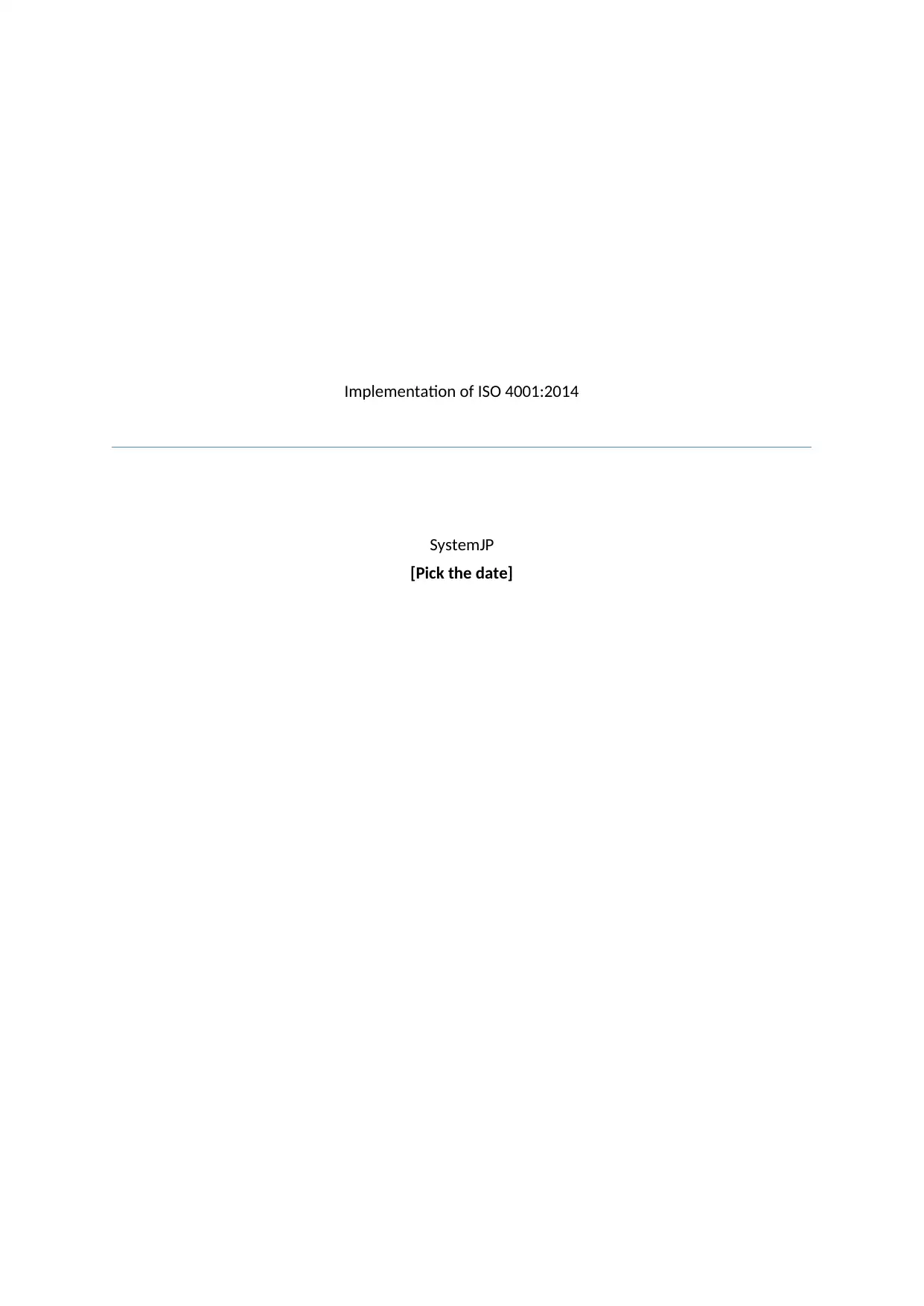
Implementation of ISO 4001:2014
SystemJP
[Pick the date]
SystemJP
[Pick the date]
Paraphrase This Document
Need a fresh take? Get an instant paraphrase of this document with our AI Paraphraser
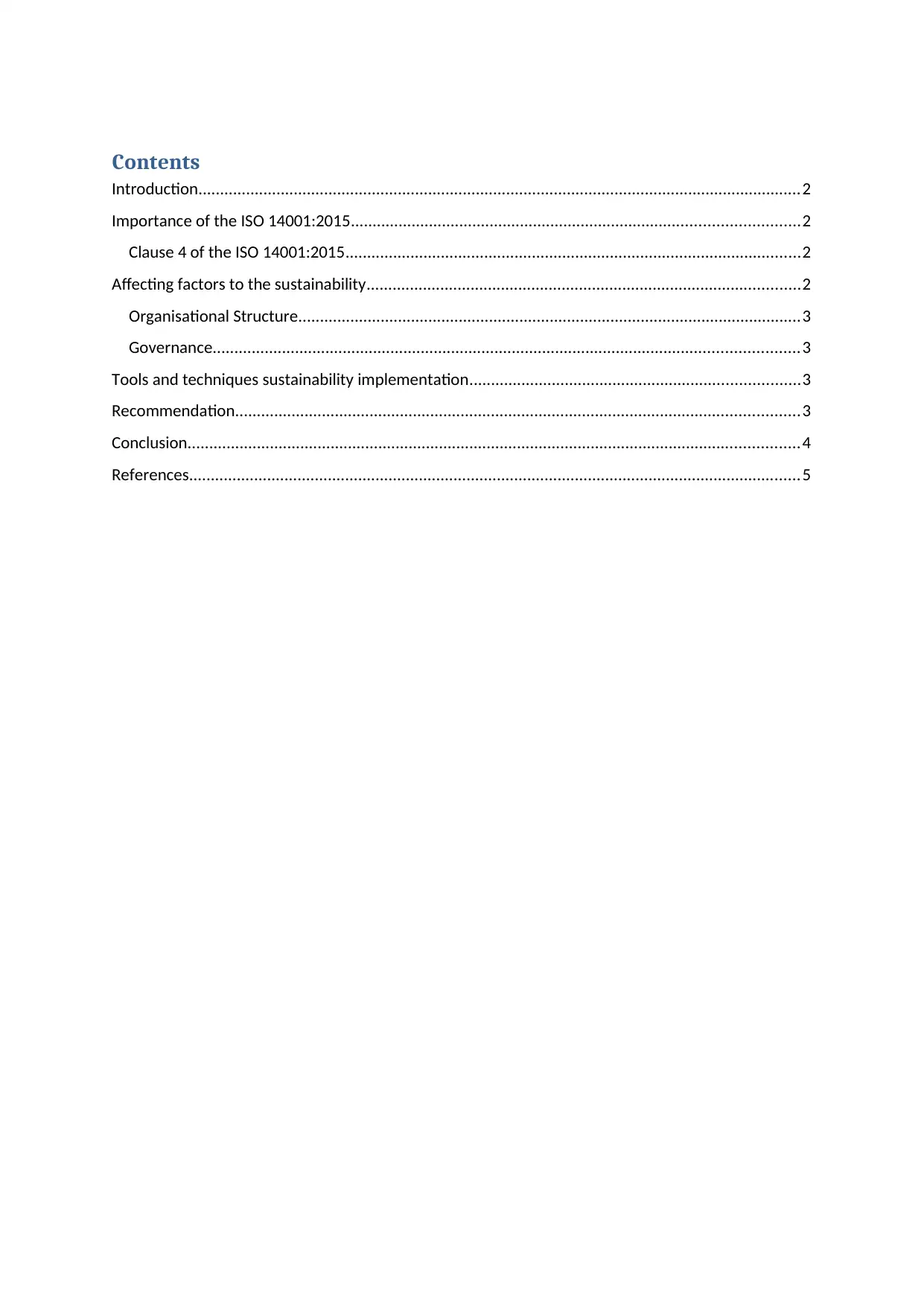
Contents
Introduction...........................................................................................................................................2
Importance of the ISO 14001:2015.......................................................................................................2
Clause 4 of the ISO 14001:2015.........................................................................................................2
Affecting factors to the sustainability....................................................................................................2
Organisational Structure....................................................................................................................3
Governance.......................................................................................................................................3
Tools and techniques sustainability implementation............................................................................3
Recommendation..................................................................................................................................3
Conclusion.............................................................................................................................................4
References.............................................................................................................................................5
Introduction...........................................................................................................................................2
Importance of the ISO 14001:2015.......................................................................................................2
Clause 4 of the ISO 14001:2015.........................................................................................................2
Affecting factors to the sustainability....................................................................................................2
Organisational Structure....................................................................................................................3
Governance.......................................................................................................................................3
Tools and techniques sustainability implementation............................................................................3
Recommendation..................................................................................................................................3
Conclusion.............................................................................................................................................4
References.............................................................................................................................................5
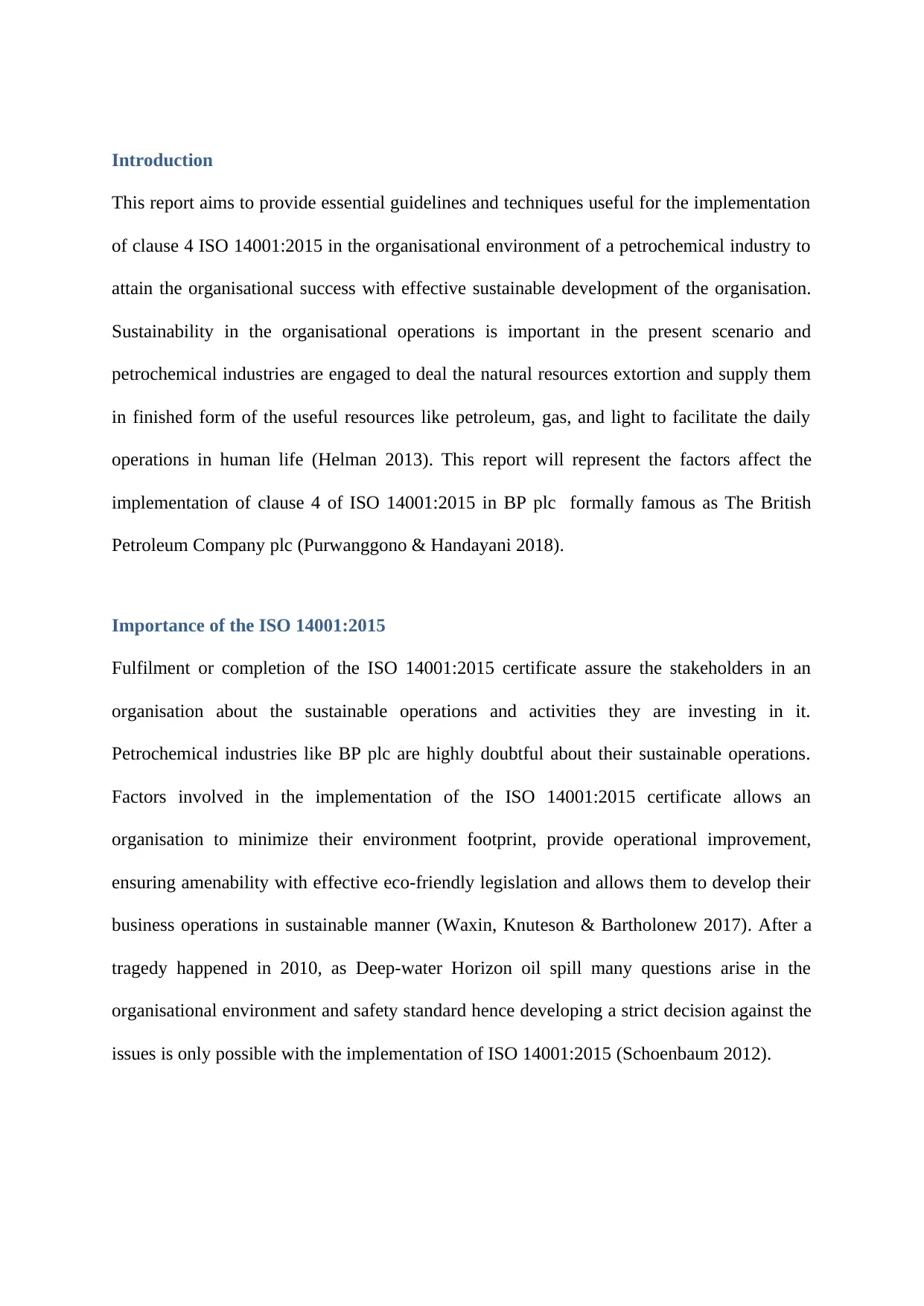
Introduction
This report aims to provide essential guidelines and techniques useful for the implementation
of clause 4 ISO 14001:2015 in the organisational environment of a petrochemical industry to
attain the organisational success with effective sustainable development of the organisation.
Sustainability in the organisational operations is important in the present scenario and
petrochemical industries are engaged to deal the natural resources extortion and supply them
in finished form of the useful resources like petroleum, gas, and light to facilitate the daily
operations in human life (Helman 2013). This report will represent the factors affect the
implementation of clause 4 of ISO 14001:2015 in BP plc formally famous as The British
Petroleum Company plc (Purwanggono & Handayani 2018).
Importance of the ISO 14001:2015
Fulfilment or completion of the ISO 14001:2015 certificate assure the stakeholders in an
organisation about the sustainable operations and activities they are investing in it.
Petrochemical industries like BP plc are highly doubtful about their sustainable operations.
Factors involved in the implementation of the ISO 14001:2015 certificate allows an
organisation to minimize their environment footprint, provide operational improvement,
ensuring amenability with effective eco-friendly legislation and allows them to develop their
business operations in sustainable manner (Waxin, Knuteson & Bartholonew 2017). After a
tragedy happened in 2010, as Deep-water Horizon oil spill many questions arise in the
organisational environment and safety standard hence developing a strict decision against the
issues is only possible with the implementation of ISO 14001:2015 (Schoenbaum 2012).
This report aims to provide essential guidelines and techniques useful for the implementation
of clause 4 ISO 14001:2015 in the organisational environment of a petrochemical industry to
attain the organisational success with effective sustainable development of the organisation.
Sustainability in the organisational operations is important in the present scenario and
petrochemical industries are engaged to deal the natural resources extortion and supply them
in finished form of the useful resources like petroleum, gas, and light to facilitate the daily
operations in human life (Helman 2013). This report will represent the factors affect the
implementation of clause 4 of ISO 14001:2015 in BP plc formally famous as The British
Petroleum Company plc (Purwanggono & Handayani 2018).
Importance of the ISO 14001:2015
Fulfilment or completion of the ISO 14001:2015 certificate assure the stakeholders in an
organisation about the sustainable operations and activities they are investing in it.
Petrochemical industries like BP plc are highly doubtful about their sustainable operations.
Factors involved in the implementation of the ISO 14001:2015 certificate allows an
organisation to minimize their environment footprint, provide operational improvement,
ensuring amenability with effective eco-friendly legislation and allows them to develop their
business operations in sustainable manner (Waxin, Knuteson & Bartholonew 2017). After a
tragedy happened in 2010, as Deep-water Horizon oil spill many questions arise in the
organisational environment and safety standard hence developing a strict decision against the
issues is only possible with the implementation of ISO 14001:2015 (Schoenbaum 2012).
⊘ This is a preview!⊘
Do you want full access?
Subscribe today to unlock all pages.

Trusted by 1+ million students worldwide
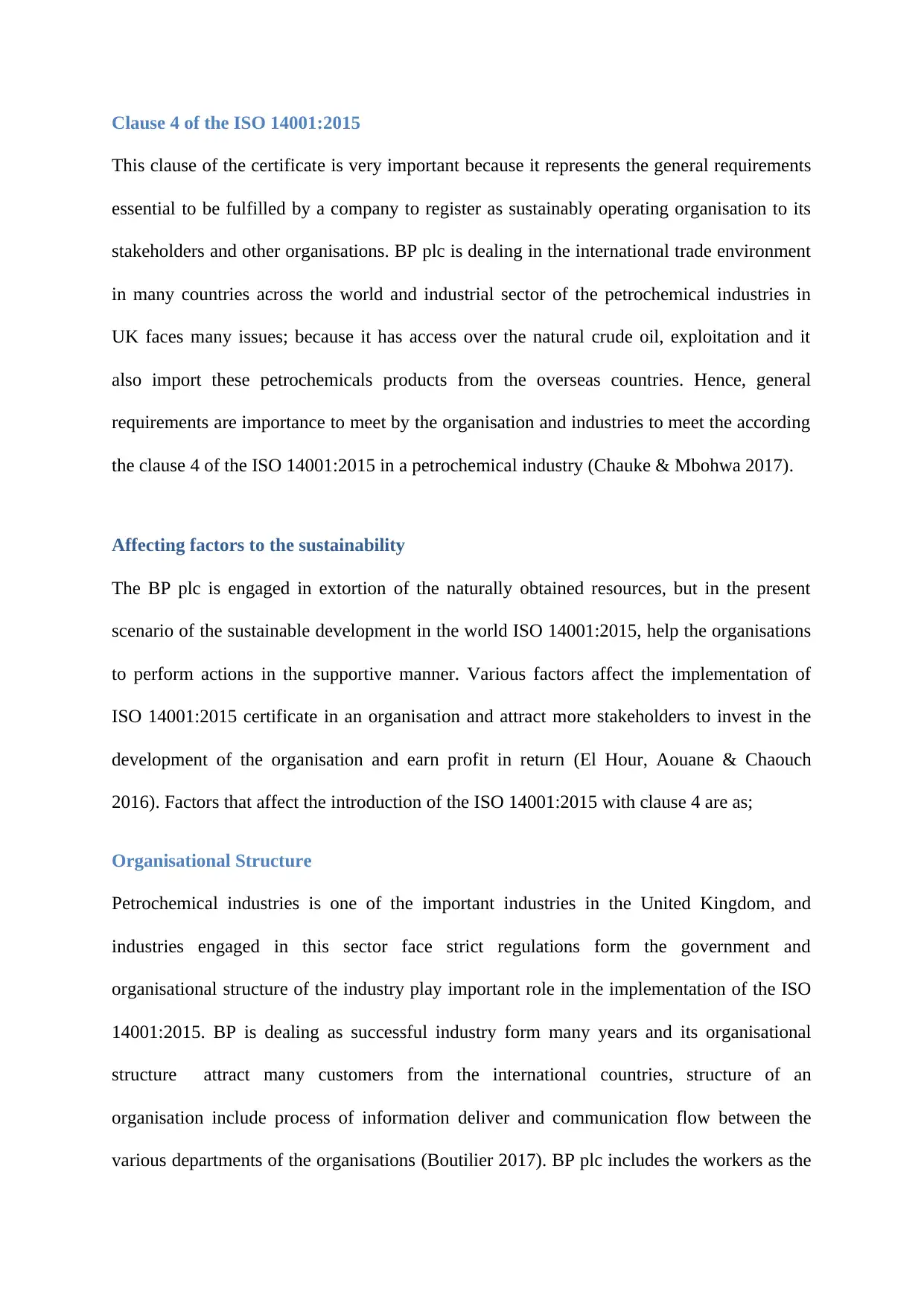
Clause 4 of the ISO 14001:2015
This clause of the certificate is very important because it represents the general requirements
essential to be fulfilled by a company to register as sustainably operating organisation to its
stakeholders and other organisations. BP plc is dealing in the international trade environment
in many countries across the world and industrial sector of the petrochemical industries in
UK faces many issues; because it has access over the natural crude oil, exploitation and it
also import these petrochemicals products from the overseas countries. Hence, general
requirements are importance to meet by the organisation and industries to meet the according
the clause 4 of the ISO 14001:2015 in a petrochemical industry (Chauke & Mbohwa 2017).
Affecting factors to the sustainability
The BP plc is engaged in extortion of the naturally obtained resources, but in the present
scenario of the sustainable development in the world ISO 14001:2015, help the organisations
to perform actions in the supportive manner. Various factors affect the implementation of
ISO 14001:2015 certificate in an organisation and attract more stakeholders to invest in the
development of the organisation and earn profit in return (El Hour, Aouane & Chaouch
2016). Factors that affect the introduction of the ISO 14001:2015 with clause 4 are as;
Organisational Structure
Petrochemical industries is one of the important industries in the United Kingdom, and
industries engaged in this sector face strict regulations form the government and
organisational structure of the industry play important role in the implementation of the ISO
14001:2015. BP is dealing as successful industry form many years and its organisational
structure attract many customers from the international countries, structure of an
organisation include process of information deliver and communication flow between the
various departments of the organisations (Boutilier 2017). BP plc includes the workers as the
This clause of the certificate is very important because it represents the general requirements
essential to be fulfilled by a company to register as sustainably operating organisation to its
stakeholders and other organisations. BP plc is dealing in the international trade environment
in many countries across the world and industrial sector of the petrochemical industries in
UK faces many issues; because it has access over the natural crude oil, exploitation and it
also import these petrochemicals products from the overseas countries. Hence, general
requirements are importance to meet by the organisation and industries to meet the according
the clause 4 of the ISO 14001:2015 in a petrochemical industry (Chauke & Mbohwa 2017).
Affecting factors to the sustainability
The BP plc is engaged in extortion of the naturally obtained resources, but in the present
scenario of the sustainable development in the world ISO 14001:2015, help the organisations
to perform actions in the supportive manner. Various factors affect the implementation of
ISO 14001:2015 certificate in an organisation and attract more stakeholders to invest in the
development of the organisation and earn profit in return (El Hour, Aouane & Chaouch
2016). Factors that affect the introduction of the ISO 14001:2015 with clause 4 are as;
Organisational Structure
Petrochemical industries is one of the important industries in the United Kingdom, and
industries engaged in this sector face strict regulations form the government and
organisational structure of the industry play important role in the implementation of the ISO
14001:2015. BP is dealing as successful industry form many years and its organisational
structure attract many customers from the international countries, structure of an
organisation include process of information deliver and communication flow between the
various departments of the organisations (Boutilier 2017). BP plc includes the workers as the
Paraphrase This Document
Need a fresh take? Get an instant paraphrase of this document with our AI Paraphraser
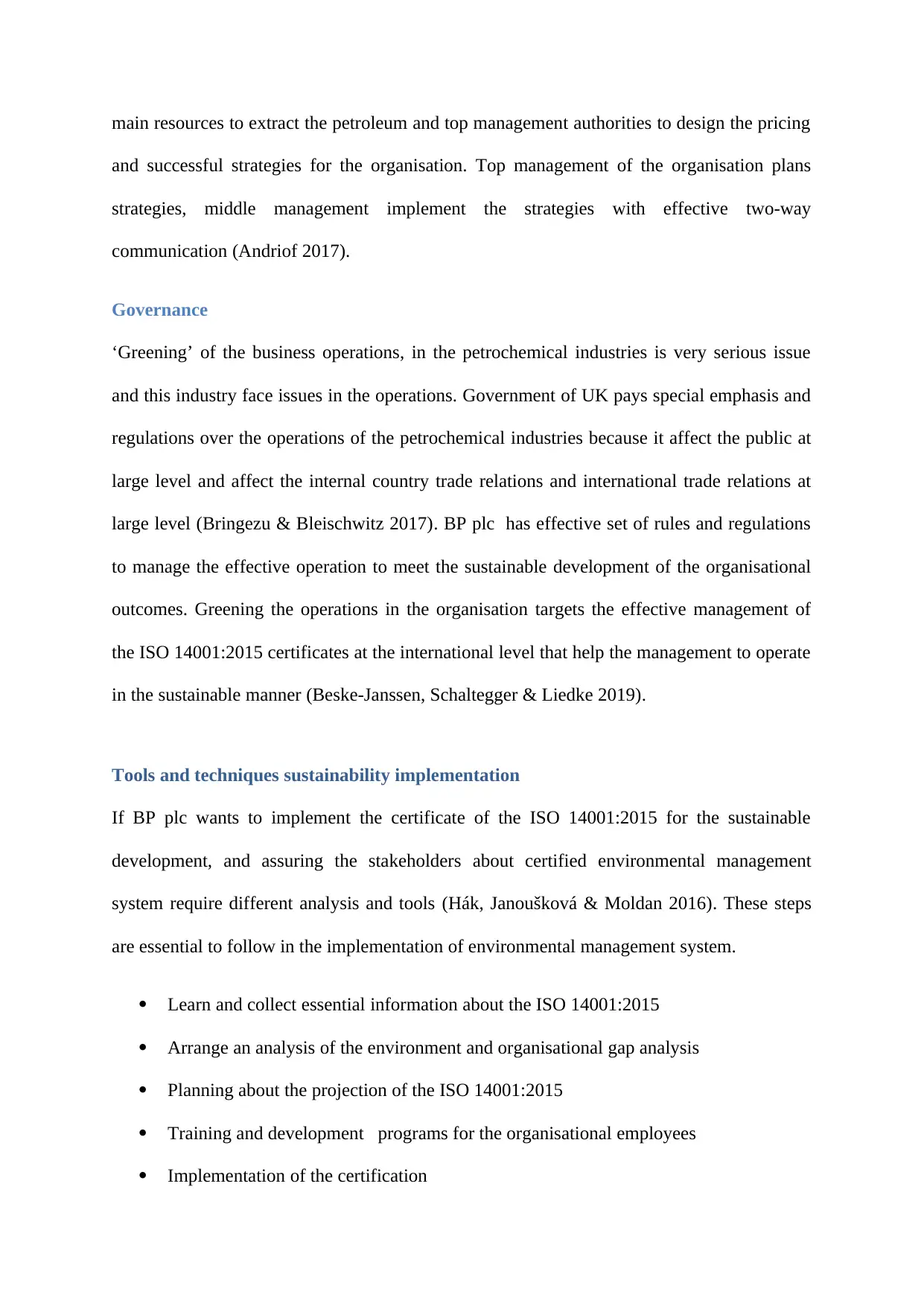
main resources to extract the petroleum and top management authorities to design the pricing
and successful strategies for the organisation. Top management of the organisation plans
strategies, middle management implement the strategies with effective two-way
communication (Andriof 2017).
Governance
‘Greening’ of the business operations, in the petrochemical industries is very serious issue
and this industry face issues in the operations. Government of UK pays special emphasis and
regulations over the operations of the petrochemical industries because it affect the public at
large level and affect the internal country trade relations and international trade relations at
large level (Bringezu & Bleischwitz 2017). BP plc has effective set of rules and regulations
to manage the effective operation to meet the sustainable development of the organisational
outcomes. Greening the operations in the organisation targets the effective management of
the ISO 14001:2015 certificates at the international level that help the management to operate
in the sustainable manner (Beske-Janssen, Schaltegger & Liedke 2019).
Tools and techniques sustainability implementation
If BP plc wants to implement the certificate of the ISO 14001:2015 for the sustainable
development, and assuring the stakeholders about certified environmental management
system require different analysis and tools (Hák, Janoušková & Moldan 2016). These steps
are essential to follow in the implementation of environmental management system.
Learn and collect essential information about the ISO 14001:2015
Arrange an analysis of the environment and organisational gap analysis
Planning about the projection of the ISO 14001:2015
Training and development programs for the organisational employees
Implementation of the certification
and successful strategies for the organisation. Top management of the organisation plans
strategies, middle management implement the strategies with effective two-way
communication (Andriof 2017).
Governance
‘Greening’ of the business operations, in the petrochemical industries is very serious issue
and this industry face issues in the operations. Government of UK pays special emphasis and
regulations over the operations of the petrochemical industries because it affect the public at
large level and affect the internal country trade relations and international trade relations at
large level (Bringezu & Bleischwitz 2017). BP plc has effective set of rules and regulations
to manage the effective operation to meet the sustainable development of the organisational
outcomes. Greening the operations in the organisation targets the effective management of
the ISO 14001:2015 certificates at the international level that help the management to operate
in the sustainable manner (Beske-Janssen, Schaltegger & Liedke 2019).
Tools and techniques sustainability implementation
If BP plc wants to implement the certificate of the ISO 14001:2015 for the sustainable
development, and assuring the stakeholders about certified environmental management
system require different analysis and tools (Hák, Janoušková & Moldan 2016). These steps
are essential to follow in the implementation of environmental management system.
Learn and collect essential information about the ISO 14001:2015
Arrange an analysis of the environment and organisational gap analysis
Planning about the projection of the ISO 14001:2015
Training and development programs for the organisational employees
Implementation of the certification
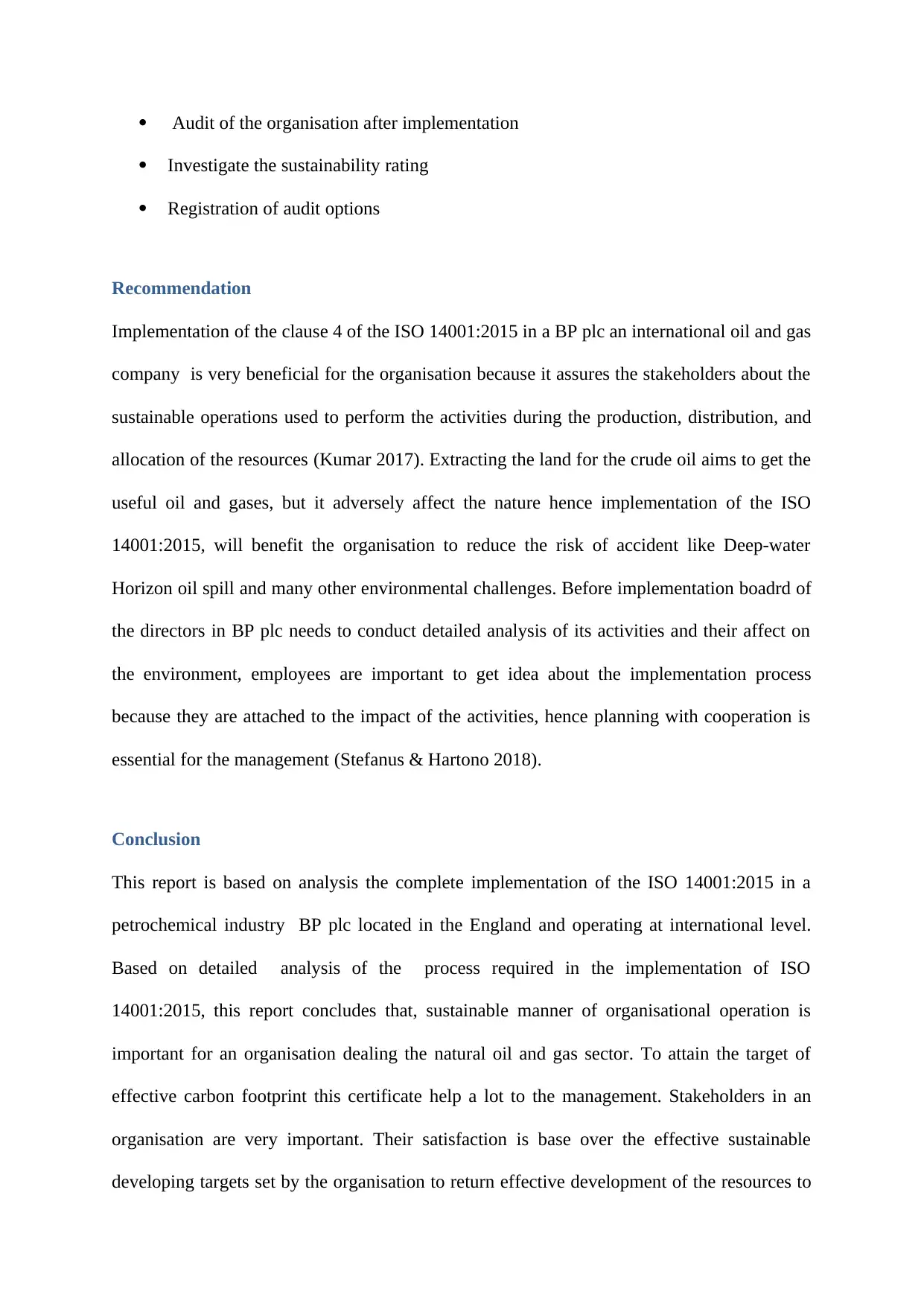
Audit of the organisation after implementation
Investigate the sustainability rating
Registration of audit options
Recommendation
Implementation of the clause 4 of the ISO 14001:2015 in a BP plc an international oil and gas
company is very beneficial for the organisation because it assures the stakeholders about the
sustainable operations used to perform the activities during the production, distribution, and
allocation of the resources (Kumar 2017). Extracting the land for the crude oil aims to get the
useful oil and gases, but it adversely affect the nature hence implementation of the ISO
14001:2015, will benefit the organisation to reduce the risk of accident like Deep-water
Horizon oil spill and many other environmental challenges. Before implementation boadrd of
the directors in BP plc needs to conduct detailed analysis of its activities and their affect on
the environment, employees are important to get idea about the implementation process
because they are attached to the impact of the activities, hence planning with cooperation is
essential for the management (Stefanus & Hartono 2018).
Conclusion
This report is based on analysis the complete implementation of the ISO 14001:2015 in a
petrochemical industry BP plc located in the England and operating at international level.
Based on detailed analysis of the process required in the implementation of ISO
14001:2015, this report concludes that, sustainable manner of organisational operation is
important for an organisation dealing the natural oil and gas sector. To attain the target of
effective carbon footprint this certificate help a lot to the management. Stakeholders in an
organisation are very important. Their satisfaction is base over the effective sustainable
developing targets set by the organisation to return effective development of the resources to
Investigate the sustainability rating
Registration of audit options
Recommendation
Implementation of the clause 4 of the ISO 14001:2015 in a BP plc an international oil and gas
company is very beneficial for the organisation because it assures the stakeholders about the
sustainable operations used to perform the activities during the production, distribution, and
allocation of the resources (Kumar 2017). Extracting the land for the crude oil aims to get the
useful oil and gases, but it adversely affect the nature hence implementation of the ISO
14001:2015, will benefit the organisation to reduce the risk of accident like Deep-water
Horizon oil spill and many other environmental challenges. Before implementation boadrd of
the directors in BP plc needs to conduct detailed analysis of its activities and their affect on
the environment, employees are important to get idea about the implementation process
because they are attached to the impact of the activities, hence planning with cooperation is
essential for the management (Stefanus & Hartono 2018).
Conclusion
This report is based on analysis the complete implementation of the ISO 14001:2015 in a
petrochemical industry BP plc located in the England and operating at international level.
Based on detailed analysis of the process required in the implementation of ISO
14001:2015, this report concludes that, sustainable manner of organisational operation is
important for an organisation dealing the natural oil and gas sector. To attain the target of
effective carbon footprint this certificate help a lot to the management. Stakeholders in an
organisation are very important. Their satisfaction is base over the effective sustainable
developing targets set by the organisation to return effective development of the resources to
⊘ This is a preview!⊘
Do you want full access?
Subscribe today to unlock all pages.

Trusted by 1+ million students worldwide
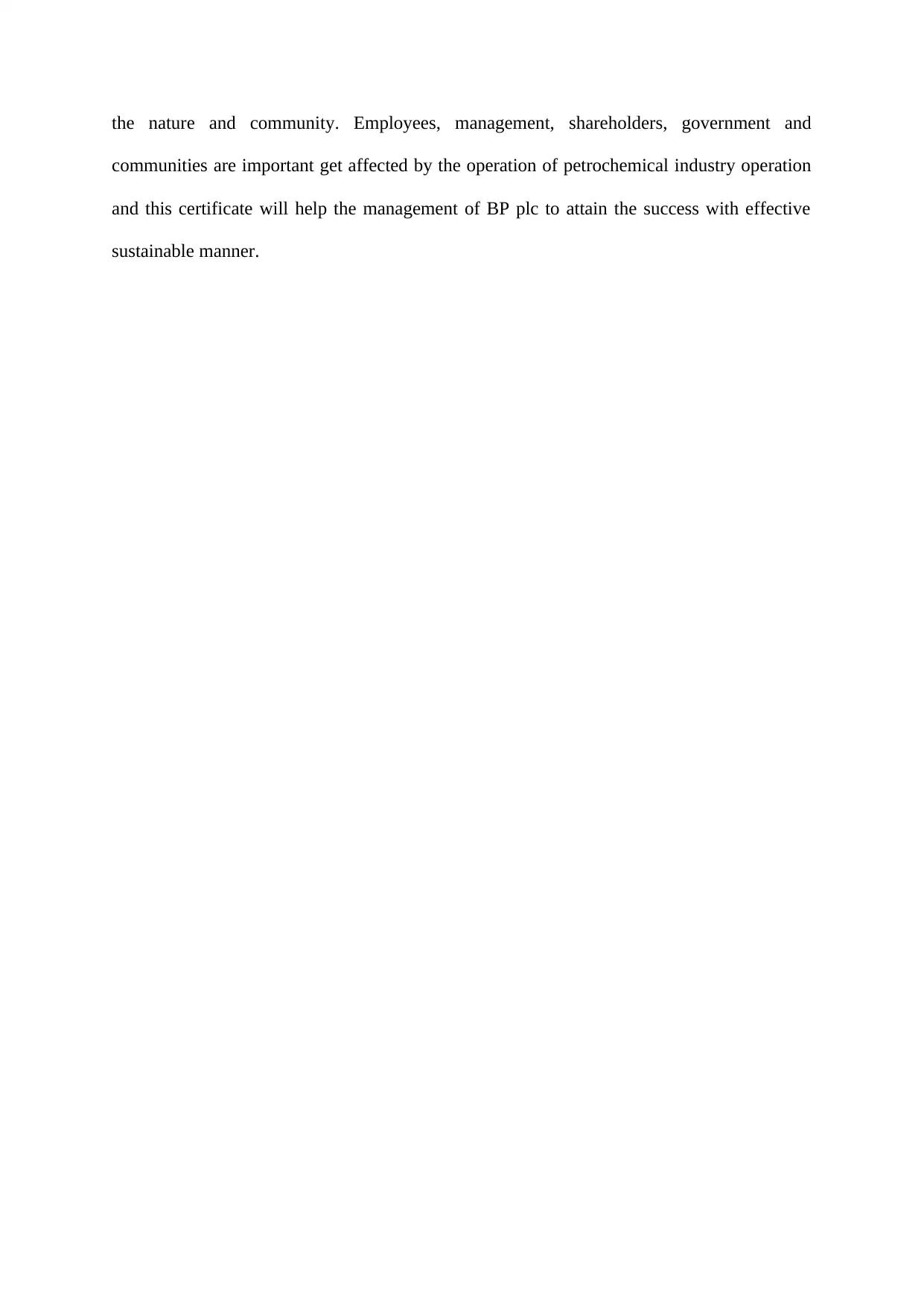
the nature and community. Employees, management, shareholders, government and
communities are important get affected by the operation of petrochemical industry operation
and this certificate will help the management of BP plc to attain the success with effective
sustainable manner.
communities are important get affected by the operation of petrochemical industry operation
and this certificate will help the management of BP plc to attain the success with effective
sustainable manner.
Paraphrase This Document
Need a fresh take? Get an instant paraphrase of this document with our AI Paraphraser
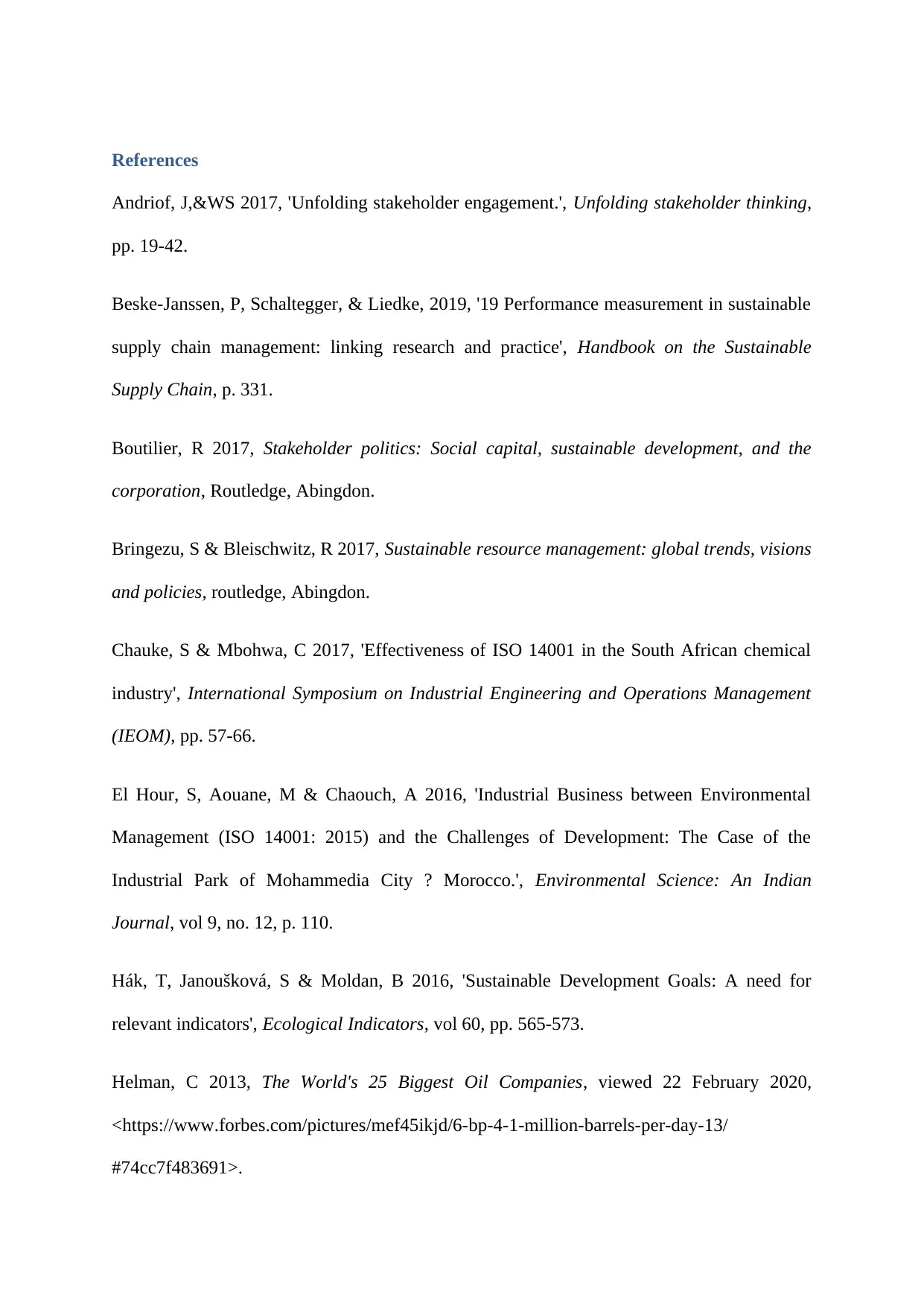
References
Andriof, J,&WS 2017, 'Unfolding stakeholder engagement.', Unfolding stakeholder thinking,
pp. 19-42.
Beske-Janssen, P, Schaltegger, & Liedke, 2019, '19 Performance measurement in sustainable
supply chain management: linking research and practice', Handbook on the Sustainable
Supply Chain, p. 331.
Boutilier, R 2017, Stakeholder politics: Social capital, sustainable development, and the
corporation, Routledge, Abingdon.
Bringezu, S & Bleischwitz, R 2017, Sustainable resource management: global trends, visions
and policies, routledge, Abingdon.
Chauke, S & Mbohwa, C 2017, 'Effectiveness of ISO 14001 in the South African chemical
industry', International Symposium on Industrial Engineering and Operations Management
(IEOM), pp. 57-66.
El Hour, S, Aouane, M & Chaouch, A 2016, 'Industrial Business between Environmental
Management (ISO 14001: 2015) and the Challenges of Development: The Case of the
Industrial Park of Mohammedia City ? Morocco.', Environmental Science: An Indian
Journal, vol 9, no. 12, p. 110.
Hák, T, Janoušková, S & Moldan, B 2016, 'Sustainable Development Goals: A need for
relevant indicators', Ecological Indicators, vol 60, pp. 565-573.
Helman, C 2013, The World's 25 Biggest Oil Companies, viewed 22 February 2020,
<https://www.forbes.com/pictures/mef45ikjd/6-bp-4-1-million-barrels-per-day-13/
#74cc7f483691>.
Andriof, J,&WS 2017, 'Unfolding stakeholder engagement.', Unfolding stakeholder thinking,
pp. 19-42.
Beske-Janssen, P, Schaltegger, & Liedke, 2019, '19 Performance measurement in sustainable
supply chain management: linking research and practice', Handbook on the Sustainable
Supply Chain, p. 331.
Boutilier, R 2017, Stakeholder politics: Social capital, sustainable development, and the
corporation, Routledge, Abingdon.
Bringezu, S & Bleischwitz, R 2017, Sustainable resource management: global trends, visions
and policies, routledge, Abingdon.
Chauke, S & Mbohwa, C 2017, 'Effectiveness of ISO 14001 in the South African chemical
industry', International Symposium on Industrial Engineering and Operations Management
(IEOM), pp. 57-66.
El Hour, S, Aouane, M & Chaouch, A 2016, 'Industrial Business between Environmental
Management (ISO 14001: 2015) and the Challenges of Development: The Case of the
Industrial Park of Mohammedia City ? Morocco.', Environmental Science: An Indian
Journal, vol 9, no. 12, p. 110.
Hák, T, Janoušková, S & Moldan, B 2016, 'Sustainable Development Goals: A need for
relevant indicators', Ecological Indicators, vol 60, pp. 565-573.
Helman, C 2013, The World's 25 Biggest Oil Companies, viewed 22 February 2020,
<https://www.forbes.com/pictures/mef45ikjd/6-bp-4-1-million-barrels-per-day-13/
#74cc7f483691>.
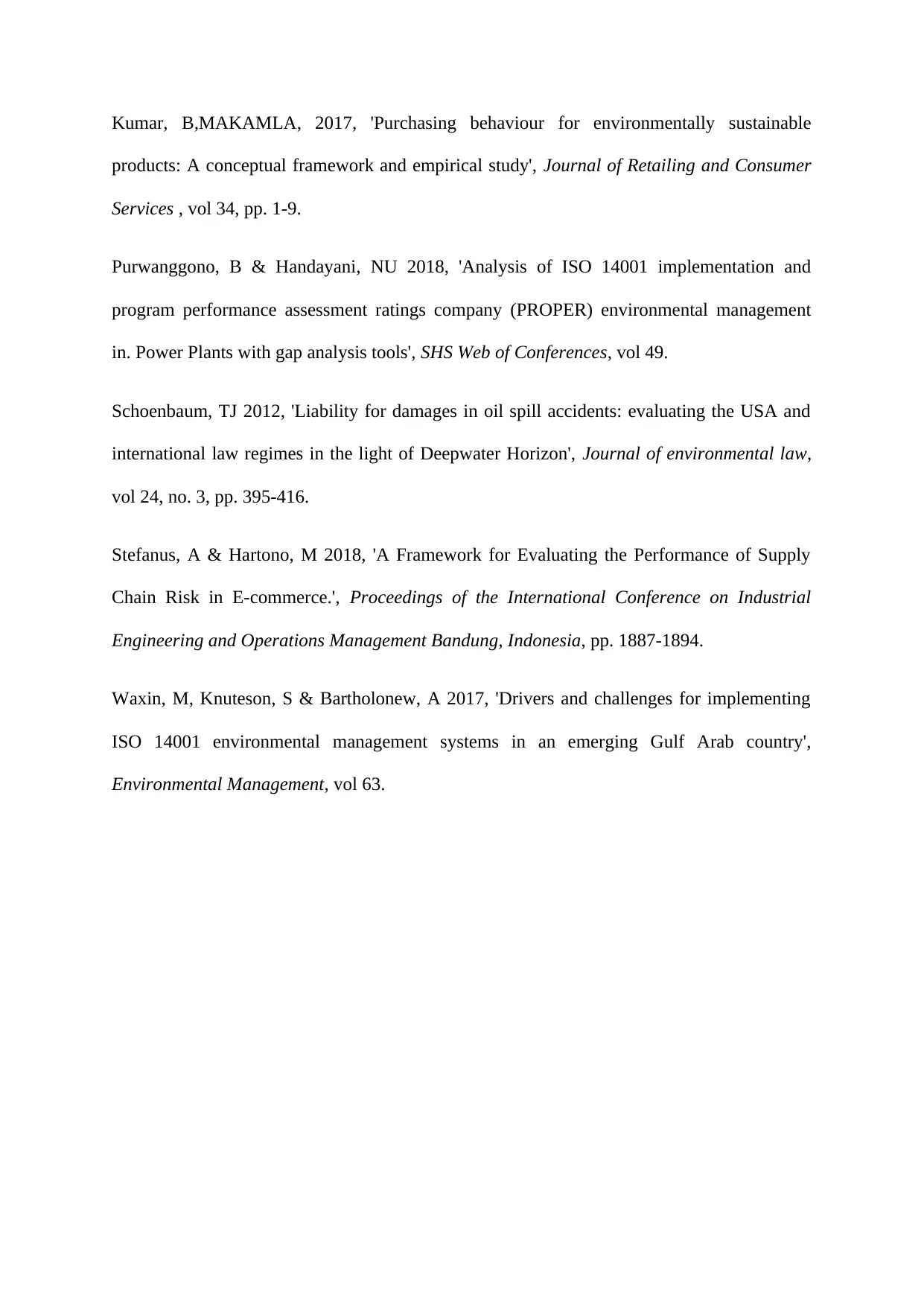
Kumar, B,MAKAMLA, 2017, 'Purchasing behaviour for environmentally sustainable
products: A conceptual framework and empirical study', Journal of Retailing and Consumer
Services , vol 34, pp. 1-9.
Purwanggono, B & Handayani, NU 2018, 'Analysis of ISO 14001 implementation and
program performance assessment ratings company (PROPER) environmental management
in. Power Plants with gap analysis tools', SHS Web of Conferences, vol 49.
Schoenbaum, TJ 2012, 'Liability for damages in oil spill accidents: evaluating the USA and
international law regimes in the light of Deepwater Horizon', Journal of environmental law,
vol 24, no. 3, pp. 395-416.
Stefanus, A & Hartono, M 2018, 'A Framework for Evaluating the Performance of Supply
Chain Risk in E-commerce.', Proceedings of the International Conference on Industrial
Engineering and Operations Management Bandung, Indonesia, pp. 1887-1894.
Waxin, M, Knuteson, S & Bartholonew, A 2017, 'Drivers and challenges for implementing
ISO 14001 environmental management systems in an emerging Gulf Arab country',
Environmental Management, vol 63.
products: A conceptual framework and empirical study', Journal of Retailing and Consumer
Services , vol 34, pp. 1-9.
Purwanggono, B & Handayani, NU 2018, 'Analysis of ISO 14001 implementation and
program performance assessment ratings company (PROPER) environmental management
in. Power Plants with gap analysis tools', SHS Web of Conferences, vol 49.
Schoenbaum, TJ 2012, 'Liability for damages in oil spill accidents: evaluating the USA and
international law regimes in the light of Deepwater Horizon', Journal of environmental law,
vol 24, no. 3, pp. 395-416.
Stefanus, A & Hartono, M 2018, 'A Framework for Evaluating the Performance of Supply
Chain Risk in E-commerce.', Proceedings of the International Conference on Industrial
Engineering and Operations Management Bandung, Indonesia, pp. 1887-1894.
Waxin, M, Knuteson, S & Bartholonew, A 2017, 'Drivers and challenges for implementing
ISO 14001 environmental management systems in an emerging Gulf Arab country',
Environmental Management, vol 63.
⊘ This is a preview!⊘
Do you want full access?
Subscribe today to unlock all pages.

Trusted by 1+ million students worldwide
1 out of 9
Related Documents
Your All-in-One AI-Powered Toolkit for Academic Success.
+13062052269
info@desklib.com
Available 24*7 on WhatsApp / Email
![[object Object]](/_next/static/media/star-bottom.7253800d.svg)
Unlock your academic potential
Copyright © 2020–2026 A2Z Services. All Rights Reserved. Developed and managed by ZUCOL.




